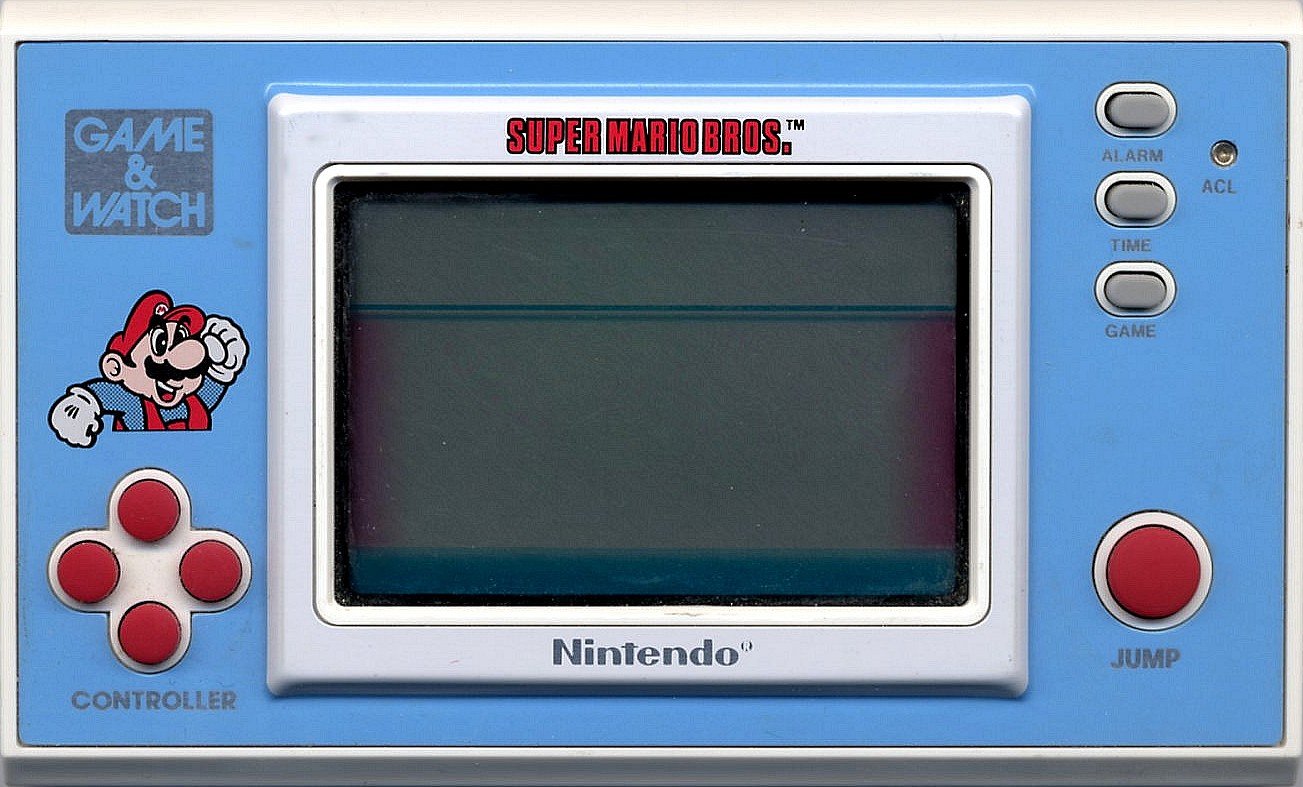Super Mario Bros. (Game & Watch): Difference between revisions
m (→References) |
WarioMario (talk | contribs) mNo edit summary |
||
| Line 1: | Line 1: | ||
{{rewrite-expand}} | {{rewrite-expand}} | ||
[[Image:mariobrosgandwgame.jpg|frame|The Unit in Action]] | [[Image:mariobrosgandwgame.jpg|frame|The Unit in Action]] | ||
'''''Super Mario Bros.''''' is a [[Game & Watch]] version of ''[[Super Mario Bros.]]'', which appeared as part of the New Widescreen (released March 8, 1988<ref>[http://www.intheattic.co.uk/super_mario_bros_1.htm Widescreen ''Super Mario Bros.'' info page at In the Attic | '''''Super Mario Bros.''''' is a [[Game & Watch]] version of ''[[Super Mario Bros.]]'', which appeared as part of the New Widescreen (released March 8, 1988)<ref>[http://www.intheattic.co.uk/super_mario_bros_1.htm Widescreen ''Super Mario Bros.'' info page at In the Attic] Retrieved 13 November 2010</ref>) and Crystal Screen (June 25, 1988)<ref>[http://www.gameandwatch.com/ Gameandwatch.com] Retrieved 13 November 2010</ref>) series, as well as an extremely rare "special" Game & Watch shaped like Famicon mascot Diskun, given out to winners of the F-1 Grand Prix Tournament in Japan<ref>[http://www.handheldmuseum.com/Nintendo/SMBPromo.htm The Handheld Games Museum's page on the "Special" ''Super Mario Bros.''] Retrieved 13 November 2010</ref> (held August 19, 1987).<ref>[http://www.intheattic.co.uk/special.htm In the Attic's page on the "Special" ''Super Mario Bros.''] Retrieved 13 November 2010</ref> | ||
==Characters | These versions of ''Super Mario Bros.'' are all essentially the same except for hardware (the Crystal Screen had a transparent screen, while the other two versions were more basic Game & Watch systems). The overall plot is the same as the console ''Super Mario Bros.'', but the game is far shorter and simpler. | ||
*[[Mario]] | |||
*[[Bullet Bill]] | ==Characters== | ||
*[[Lakitu]] | * [[Mario]] | ||
*[[Princess Peach|Princess Toadstool]] | * [[Bullet Bill]] | ||
*[[Bowser|King Koopa]] | * [[Lakitu]] | ||
* [[Princess Peach|Princess Toadstool]] | |||
* [[Bowser|King Koopa]] | |||
==Plot== | ==Plot== | ||
The story is the same: [[King Koopa]] has kidnapped [[Princess Toadstool]], and Mario is off to save her. | The story is the same: [[King Koopa]] has kidnapped [[Princess Toadstool]], and Mario is off to save her. The difference is that at the end of every level, Mario will find the Princess without having to fight a boss. | ||
The stages all auto-scroll and are much different. Further, Lakitus throw hammers as opposed to [[Spinies]]. | |||
==Gameplay== | ==Gameplay== | ||
Mario must go through eight auto scrolling levels | Mario must go through eight auto-scrolling levels without falling and losing a life. When the levels are cleared, Mario must repeat them but with enemies. | ||
==References | ==References== | ||
*''[[Super Mario Bros.]]''- | * ''[[Super Mario Bros.]]'' - both games share the title and storyline. | ||
==References== | ==References== | ||
Revision as of 00:19, August 7, 2011
It has been requested that this article be rewritten and expanded to include more information.
Super Mario Bros. is a Game & Watch version of Super Mario Bros., which appeared as part of the New Widescreen (released March 8, 1988)[1]) and Crystal Screen (June 25, 1988)[2]) series, as well as an extremely rare "special" Game & Watch shaped like Famicon mascot Diskun, given out to winners of the F-1 Grand Prix Tournament in Japan[3] (held August 19, 1987).[4]
These versions of Super Mario Bros. are all essentially the same except for hardware (the Crystal Screen had a transparent screen, while the other two versions were more basic Game & Watch systems). The overall plot is the same as the console Super Mario Bros., but the game is far shorter and simpler.
Characters
Plot
The story is the same: King Koopa has kidnapped Princess Toadstool, and Mario is off to save her. The difference is that at the end of every level, Mario will find the Princess without having to fight a boss.
The stages all auto-scroll and are much different. Further, Lakitus throw hammers as opposed to Spinies.
Gameplay
Mario must go through eight auto-scrolling levels without falling and losing a life. When the levels are cleared, Mario must repeat them but with enemies.
References
- Super Mario Bros. - both games share the title and storyline.
References
- ^ Widescreen Super Mario Bros. info page at In the Attic Retrieved 13 November 2010
- ^ Gameandwatch.com Retrieved 13 November 2010
- ^ The Handheld Games Museum's page on the "Special" Super Mario Bros. Retrieved 13 November 2010
- ^ In the Attic's page on the "Special" Super Mario Bros. Retrieved 13 November 2010
| Game & Watch games | ||
|---|---|---|
| Super Mario franchise | Donkey Kong (1982, MS) • Mario Bros. (1983, MS) • Mario's Cement Factory (1983, TT/NWS) • Mario's Bombs Away (1983, PS) • Donkey Kong Hockey (1984, MVS) • Super Mario Bros. (1986, CrS | 1987, Sp | 1988, NWS) • Mario the Juggler (1991, NWS) • Game & Watch: Super Mario Bros. (2020, CoS) | |
| Donkey Kong franchise | Donkey Kong (1982, MS) • Donkey Kong Jr. (1982, NWS | 1983, TT & PS) • Donkey Kong II (1983, MS) • Donkey Kong 3 (1984, MVS) • Donkey Kong Circus (1984, PS) • Donkey Kong Hockey (1984, MVS) | |
| Miscellaneous | Green House (1982, MS) | |
| MS: Multi Screen • TT: Table Top • PS: Panorama Screen • NWS: New Wide Screen • MVS: Micro VS. System • CrS: Crystal Screen • Sp: Special • CoS: Color Screen | ||
